KARACHI: Pakistani authorities confirmed on Saturday that the alleged mastermind of the 2008 Mumbai attacks was in their custody and sentenced to 15 years in jail on charges of terrorism financing.
Sajid Mir has been on the FBI’s list of most-wanted terrorists with a $5 million bounty on his head. He has been sought by the US and India for over a decade in connection to the Mumbai attacks in late November 2008, when militants killed more than 170 people, including six US nationals.
Mir is believed to be a leader of Lashkar-e-Taiba, the Pakistan-based militant group accused of carrying out the attacks. According to the FBI's most-wanted list, he allegedly served as the “chief planner of the attacks, directing preparations and reconnaissance, and was one of the Pakistan-based controllers during the attacks.”
He was sentenced by a court in Lahore earlier this month to 15-and-a-half years in prison and is serving his sentence at Kot Lakhpat jail.
“The sentencing in a TF (terrorism financing) case is confirmed,” Asim Iftikhar Ahmad, spokesperson for the Pakistani Ministry of Foreign Affairs, told Arab News.
Mir was indicted by an Illinois court in April 2011 and his arrest warrant was issued the same month. The court charged him with “conspiracy to injure property of foreign government; providing material support to terrorists; killing a citizen outside of the U.S. and aiding and abetting; and bombing of places of public use.”
In Pakistan, his sentencing is seen as being connected to government efforts to get off the Financial Action Task Force’s grey list.
In June 2018, the global watchdog downgraded Pakistan to its increased monitoring list for lacking measures to curb money laundering and terrorism financing.
During its plenary meeting last week, the FATF kept Pakistan on its grey list but said an onsite inspection — expected in October — could verify the country’s progress in fulfilling the watchdog’s action plan and lead to the removal of the designation.
“This issue rather became a major sticking point in FATF’s assessment of Pakistan’s progress on the action plan late last year. This was where things finally started moving in Mir’s case,” Pakistani daily newspaper Dawn reported on Saturday. “His conviction and sentencing were, therefore, major achievements that Pakistani officials showcased in their progress report given to FATF on its action plan during the latest plenary.”
Being on the FATF grey list severely restricts a country’s international borrowing capabilities. Exiting it is likely to increase foreign inflows, specifically direct investment, into Pakistan, which desperately needs funds amid dwindling foreign exchange reserves.
























